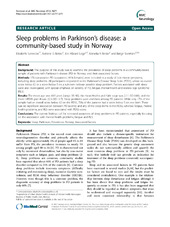Sleep problems in Parkinson’s disease: a community-based study in Norway
Peer reviewed, Journal article
Published version
Permanent lenke
https://hdl.handle.net/1956/6679Utgivelsesdato
2012-08-10Metadata
Vis full innførselSamlinger
Originalversjon
https://doi.org/10.1186/1471-2377-12-71Sammendrag
Background: The purpose of this study was to examine the prevalence of sleep problems in a community-based sample of patients with Parkinson’s disease (PD) in Norway, and their associated factors. Methods: 176 consecutive PD outpatients (41% females) were included in a study of non-motor symptoms, including sleep problems. All participants responded to the Parkinson’s Disease Sleep Scale (PDSS), where an overall score below 82 or a score below 5 on a sub-item indicate possible sleep problem. Factors associated with sleep were also investigated, with special emphasis on severity of PD, fatigue, mental health and restless legs syndrome (RLS). Results: The mean age was 68.5 years (range 35–90); the mean Hoehn and Yahr stage was 2.11 (SD 0.86), and the mean UPDRS part III was 22.3 (SD 11.7). Sleep problems were common among PD patients. While only 17% of the sample had an overall score below 82 on the PDSS, 70% of the patients had a score below 5 on one item. There was no significant association between PD severity and any of the sleep items in the PDSS; whereas fatigue, mental health problems, and RLS were associated with PDSS score. Conclusions: The current findings call for increased awareness of sleep problems in PD patients, especially focusing on the association with mental health problems, fatigue and RLS.

